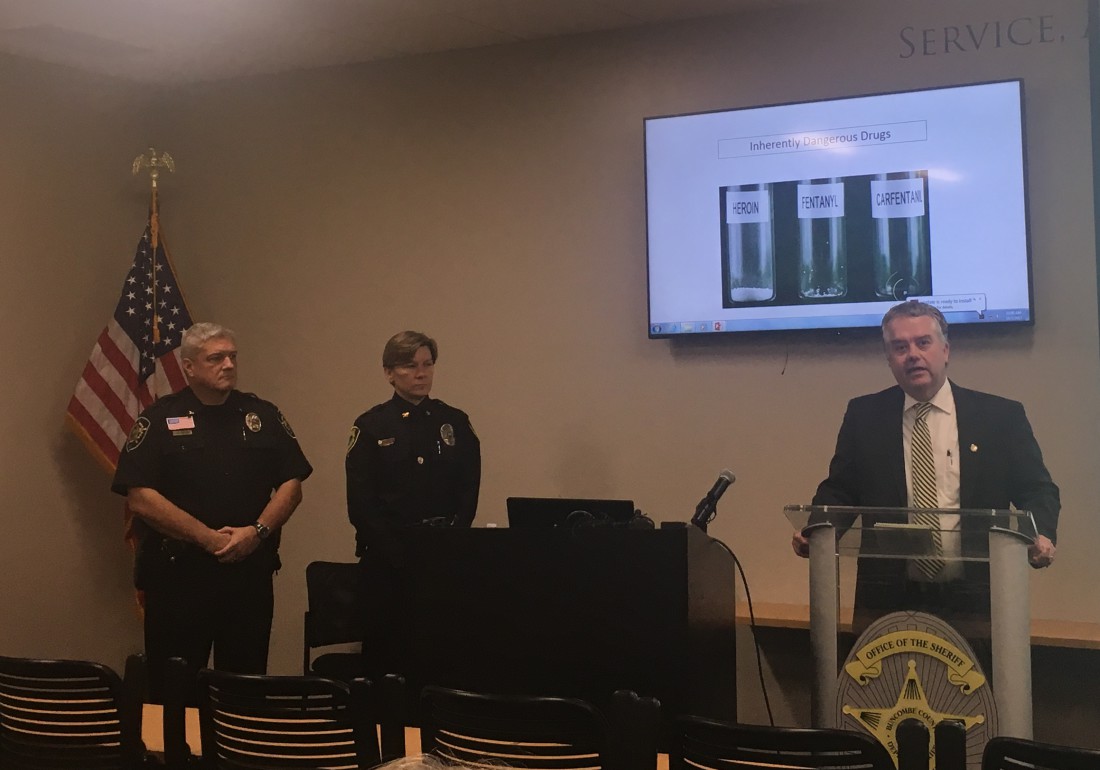Buncombe County District Attorney Todd Williams is warning of a new, deadly synthetic opioid while publicizing a diversion program aimed at giving some offenders access to treatment rather than incarceration. “It is the DA’s job to seek justice. My office has a treatment-oriented philosophy, and we’ve got to balance enforcement with treatment,” said Williams at an Oct. 3 press conference.
“We have a situation where heroin and opioid substances are going into the black market on our streets. The body count and overdose cases are skyrocketing, and we are dealing with ever more potent cuts,” explained Williams. He then talked about carfentanil, a synthetic opioid he likened to “elephant tranquilizer” that has been making the rounds in Atlanta and “is likely coming to Asheville.” Williams also warned that Narcan, a readily available overdose reversal drug, isn’t as effective against drugs cut with carfentanil, stating “one dose of Narcan doesn’t do the trick.”
Buncombe County has seen a spate of overdose calls this year. Statistics from the N.C. Division of Public Health show that at the end of August, there were 230 opioid-related emergency department visits. Last year, through the same time, the county had 84 such incidents, according to the data. That represents a 173 percent increase.
To that end, Williams is looking to help some of those charged with opioid possession. “We want to compassionately address this issue but we have to make it clear if a user’s problem needs to be subsidized through the trafficking of [opioid] drugs, there will be consequences. We have to balance community safety with justice,” the district attorney said.
Williams announced the diversion program will partner with Vaya Health and Sunrise Community, whose executive director, Kevin Mahoney, was on hand to talk about his experiences with addiction. “Fifteen years ago I was homeless and tried to kill myself. Now, I’m a survivor,” he said.
Mahoney’s program is based on having peer support, so those who have bested addiction can help and relate to those currently struggling with drug use. “It’s not just about education, but about giving [drug users] something bigger to hold onto,” explained Mahoney, noting that peers provide “authenticity” for those looking for help.
The diversion program will look to assist people with felony possession and aims to have about 30 people enter treatment via the court system on an annual basis. Mahoney added that Sunrise Community’s services are free for those seeking treatment.
Meantime, Buncombe County Sheriff Van Duncan noted that treatment is vital, as many people suffering from addiction found themselves there through ordinary circumstances. “Heroin addiction starts with a prescription 80 percent of the time,” he said.
And while Duncan wants to strike a balance to help users, he said traffickers will get no such leniency. “We will be more effective in dealing with people who profit from this plague. Hoping through consistent pursuit we will move ourselves out of this issue,” he said.
For more information about Sunrise, visit its website or call at 828-552-3858. You can learn more about substance abuse resources from Vaya Health at its website or by calling 800-849-6127.
Earlier this year, Xpress ran an in-depth report looking at the opioid crisis as a health, rather than a criminal issue. You can read “Cure for pain: Preventing opioid-related deaths” here.




Treatment is incredibly expensive and it is difficult to find openings for beds in North Carolina. There is a lot of competition for those beds as children and adults who have serious mental health issues also need care. We need more mental health options, but that takes time. There is a way to address this problem, but agencies and government are not willing to even consider this option. Medical cannabis has been used effectively to get opioid users off the drugs they are abusing. Until those institutions take steps to seriously look at this option (studies, cannabis centered treatment who are sharing their successes), we are destined to repeat the cycle of pharmaceutical solutions.
As the above poster mentioned, medical cannabis is the answer.
In states with medical cannabis programs, less opiate prescriptions are written(while insulin and blood thinner rx are not reduced) and less overdoses
People can use medical cannabis instead of opiates and never get hooked
Big pharma wouldn’t like that
Also people can detox from opiates using cannabis oil, I’ve seen it first hand